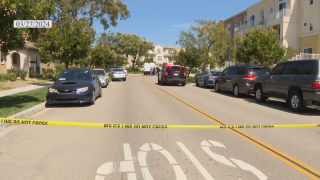
In the past two months, there have been multiple violent incidents on the streets of San Diego that — at least one expert told NBC 7's sister station, Telemundo 20 — could be linked to Mexican cartels.
While that may shock some, it is a phenomenon that has been happening in recent decades.
According to Victor Clark Alfaro, a professor of Latin American studies at SDSU and an expert on cartel warfare, this type of violence has sporadically occurred in San Diego for the past 25 years. Cartels are constantly fighting over drug routes, he said.
Get top local stories in San Diego delivered to you every morning. Sign up for NBC San Diego's News Headlines newsletter.
Three shootings in less than two months on the streets of San Diego may be worrisome, but it's not something new, according to Clark Alfaro.
"There is a presence of Mexican cartels in California, including San Diego, which is a fundamental place because of its proximity to Baja California, especially Tijuana," the professor told NBC 7.
This presence of cartels in the United States has been since been noted since the early 1990, but it's been a decades-long problem to the south. San Diego is a major border crossing for drug trafficking, and, on the other side of the border in Tijuana, as many as nine executions have taken place.
Local
"At the end of the day, drug cartels are companies," Clark Alfaro explained. "The ones we see that have been killed are the ones at the bottom of the pyramid that at some point got out of control."
According to Clark Alfaro, an expert on binational issues, on Feb. 17 in the UTC area of La Jolla, near the parking lot of the Palisade apartment complex, a man opened fire on a vehicle, hitting Christian Espinoza Silver, known as El Chato and who, according to Clark Alfaro, has ties to organized crime. On March 26, James Bryant Corona, known as El Apache, was shot outside Chili's restaurant in Chula Vista. Five hours later, there was another shooting at the Salerno luxury apartments in Otay Ranch where an unidentified person was killed.
Telemundo 20 reached out to the San Diego Police Department for more details about these investigations and their possible link to organized crime in Mexico but has not heard back.
Meanwhile, Clark Alfaro believes, cartel violence will continue on this side of the border, although he reiterates that they are likely isolated cases.
"... in California, the legal and judicial system is more effective in prosecuting and punishing criminal activity, which deters the cartels from using overt violence as we see on the Mexican side," Clark Alfaro said.
San Diego County District Attorney Summer Stephan acknowledged in an interview with NBC 7 that she was troubled by cartel violence in the region.
"We have cases pending at the moment, an ongoing investigation," Stephan said. "We're always very concerned, and it's a priority, and it's something that we work on every day to make sure that we get that spill under control and that we stop it as soon as it happens."
According to federal authorities, 50% of fentanyl, the world's deadliest drug, enters the U.S. illegally through the San Diego border sector. Because of this, the war over drug routes is expected to continue in Southern California.



